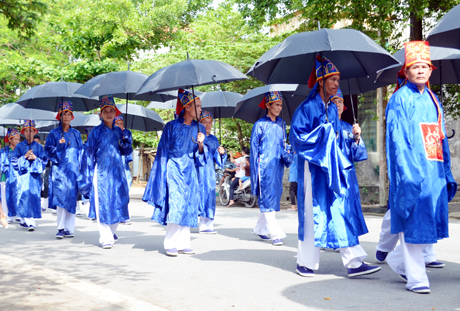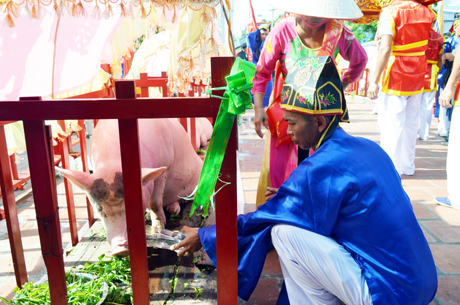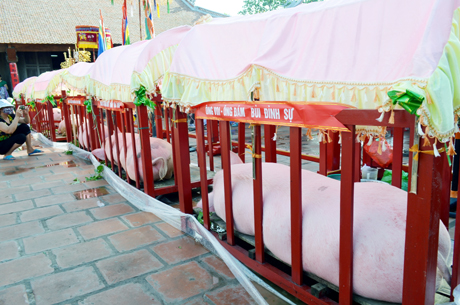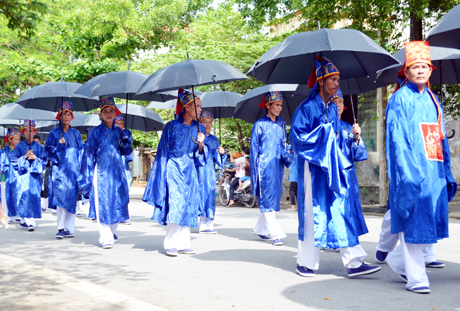
The group of 12 "Ông Đám" (traditional Vietnamese male deities) participated in the ritual of welcoming the deity's palanquin at the Trà Cổ Temple Festival in 2014.
To this day, the people of Tra Co still pass down the saying "People of Tra Co, ancestors of Do Son" to remember their origins. The elders of Tra Co village often recount to their descendants that, about 600 years ago, 12 fishing families from Do Son (Hai Phong) were swept out to sea by a storm and drifted to the Tra Co peninsula. After the disaster, 6 families, unable to endure the hardships of life there, returned to their old hometown, saying: "What kind of bounty can we get here? The bounty of figs is bitter, the bounty of banyan trees is old." The 6 families who remained had their own reasoning: "Here, we enjoy the beauty of the land, filtering water day after day to earn money to support ourselves." They encouraged each other to clear land and settle down. They combined the names of their two old villages, Tra Phuong and Co Trai, to form Tra Co village, naming their new land and the village temple they themselves built. Every year, from the first to the third day of the sixth lunar month, the people of Tra Co hold a village festival to commemorate the merits of the village's guardian deity. The Tra Co village temple is not only a place of spiritual activity but also a unique architectural masterpiece, a cultural and spiritual landmark at the northernmost point of the country. After a period of interruption due to war, the Tra Co temple festival was restored in 1993 and remains a cultural highlight and a source of pride for the local people. This traditional festival still preserves unique customs characteristic of the Red River Delta's rice-farming civilization, with strict regulations on procedures, especially in the selection of the person to act as the "Ông Đám" (village elder), and the care of the piglet prepared for the ceremony, which everyone respectfully calls "Ông Voi" (Mr. Elephant)...

Before the ritual at the village square, the village elders would often take the opportunity to give "Ông Voi" (the elephant god) water to conserve his strength.
Accordingly, the village elder is chosen by the village to perform the rituals of offering incense to the village deity during the year. Before the festival, the village holds a meeting and selects 12 men from 12 exemplary families to be the village elders. They must be men aged 25 to 35, married with children, healthy, capable of earning a living, morally upright, with harmonious families, and free from mourning. Those chosen by the village to be village elders are very honored and proud. Doing a good job as village elder during the year means receiving blessings, good health, and good fortune in business…
However, the funeral officiants also have to abide by quite a few conventions and taboos. Hoang Minh Dong, Vice Chairman of the People's Committee of Tra Co Ward, who was appointed as a funeral officiant in 2012-2013, said: “Previously, funeral officiants had to endure many taboos: They were not allowed to cut their hair or shave their beards, eat raw food, dog or cat meat, or light incense or perform rituals at funerals… Because, according to belief, the funeral officiants are children of the gods. They were even forbidden from having sexual relations with their wives for a year. Nowadays, many of these taboos have been removed, but some regulations remain, such as not eating dog meat or raw food, not lighting incense at funerals, and not using vulgar language…”

The "Elephants" are being prepared for the competition...
There are also strict regulations, and raising "Ông Voi" (the Elephant God) is extremely elaborate. Mr. Vu Tien Nong, an elderly resident of Tra Co, said: "In the past, the tutelary deities rode elephants into battle to protect the coastal areas of their homeland. Elephants also represent strength and vigor. Therefore, elephants are necessary for worshipping the gods. And to have an elephant to worship the gods in the temple festival, the people of Tra Co used pigs, a common livestock of agricultural communities, as a substitute. This animal is respectfully called "Ông Voi" (Mr. Elephant)."
Mr. Hoang Minh Dong further added: “After the grand ceremony on the 10th day of the 8th lunar month, those appointed as the village elders will bring their family's "Elephant" to the communal house to offer prayers to the deities, report to the village guardian spirit, and draw lots to determine their order. The "Elephants" are considered sacred animals, carefully protected and cared for, fed well and kept clean, cool in the summer, and warm in the winter…”. Notably, in daily life, it is considered taboo to call the "Elephant" a… pig! Unlike before, when the "Elephants" were the slow-growing Mong Cai breed, today's "Elephants" are hybrid pigs that weigh over 200 kg in less than a year, and some even reach over 300 kg. The 1.5-meter-long red-painted wooden cage used to carry the "Elephant" to the communal house has become too cramped…
On the afternoon of the 30th day of the 5th lunar month, after the ancestral worship ceremony, the festival organizers will use red-painted cages with beautifully decorated fabric curtains to protect the "Elephant" from the sun and rain. The 12 "Elephants" are washed clean by the organizers and then paraded to the temple courtyard, arranged in two rows to pay homage to the deity. The procession includes: gongs and drums for the vanguard; banners, a traditional Vietnamese musical instrument (bau tran cai gio), banners representing the five elements, a ceremonial drum team, and a central procession; followed by the "Elephants," then the ceremonial committee and the families of the 12 organizers… After the ceremony of paying respects to the deities, the festival organizing committee will evaluate and score the "Elephants," awarding a first prize to the one with the largest, most beautiful, longest, and heaviest neck. After the judging, the other "Elephants" will be treated like ordinary pigs, while the first prize winner will be kept for the village to slaughter as a sacrifice to the deity. In particular, in the offering tray to the gods, besides the pig's head, a tuft of shoulder hair from "Ông Voi" (called "uế mao huyết") is indispensable. After the offering, this tuft of shoulder hair is placed at the base of the banyan tree next to the temple courtyard. This is a very sacred and important ritual in the Trà Cổ temple festival. The awarding ceremony for the head of the ceremony and "Ông Voi" is held during the main festival, on the morning of the 1st day of the 6th lunar month.
It can be said that the Tra Co communal house festival and the "Elephant God" custom are unique cultural features that the local people have preserved to this day.

 VI
VI EN
EN

































